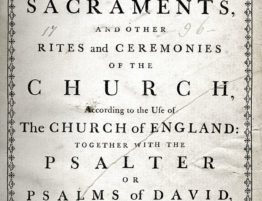
Today is Palm Sunday, the beginning of Holy Week, and an unusual Palm Sunday it is! This is certainly the first time I’ve celebrated Palm Sunday without the traditional procession of the palms. This is the first Palm Sunday most of the congregation has watched virtually. This will be my first Holy Week in years without our typical All Saints cycle of services.
And I bet for most folks this is among the first times you’ve had Morning Prayer followed by Ante-Communion as the main Sunday Service. Believe it or not, such a setup didn’t used to be unusual in Anglican Circles. In fact, until about 100 years ago or so, it was typical throughout Anglicanism for Morning Prayer, Litany, and Ante-Communion (i.e. the first half of Communion) to be the regular Sunday worship. Communion itself was often only three or four times a year. Now, don’t get me wrong, I think weekly Communion is a good thing. But I’ve really enjoyed reviving Morning Prayer as part of the Sunday routine. In the American 1928 Prayer Book, the rubrics allow us to move from Morning Prayer to Communion (or in our case Ante-Communion) after either of the two Canticles that follow the Lessons. In the past we’ve sometimes used an abbreviated Morning Prayer through the first Canticle to add a nice preface to Communion on special occasions. Indeed, that’s likely what we’ll do for the rest of Holy Week. But today is the first time can remember ever using both lessons and canticles before moving to Communion. And the reason I decided to do that for Palm Sunday is that it gives us the Triumphal Entry in the New Testament Lesson, Zechariah’s prophecy that predicts to the Triumphal Entry in the Old Testament Lesson, the full Passion Narrative in the Gospel from Ante-Communion, and a great Epistle reading from Philippians to tie the rest readings together. Since we were without our usual Palms Procession, I thought this would be a good way to bring out the Palm Sunday themes in a unique worship setting.
In the Triumphal Entry, as we read in the Morning Prayer lessons, we see Jesus hailed as the Davidic King by the crowds, who said “Hosanna! Blessed is he who comes in the name of the Lord!” You probably recognize this statement from the Benidictus Qui Venit that follows the Sanctus in our Communion liturgy. If you look at the text of the 1928 Book of Common Prayer and its predecessors, the phrase isn’t actually there. No, in the Prayer Book, we pass from “Glory be to thee O Lord Most High. Amen” to the opening of the consecration: “All glory be to thee.” While I certainly appreciate the parallel “glory” in the way the Prayer Book presents it, I’m glad the official Hymnal settings gave us the option to sing “Blessed is he who comes in the name of the Lord. Hosanna in the highest!” as is the older tradition. Sometimes you’ll hear folks say that it isn’t theologically appropriate to add this quotation from the Triumphal Entry. After all, weren’t these the same folks who in our Gospel reading are crying “Crucify Him!”? Maybe they are, and maybe they’re not. The text isn’t clear on that point. But the Scriptures as a whole are clear that it is appropriate to hail Jesus as our King, and to ask him to save us (which is what “hosanna” means). As we chanted in our psalm this morning:
Lift up your heads, O ye gates, and be ye lift up, ye everlasting doors; * and the King of glory shall come in.
Who is this King of glory? *It is the Lord strong and mighty, even the LORD mighty in battle.
Lift up your heads, O ye gates, and be ye lift up, ye everlasting doors; * and the King of glory shall come in.
Who is this King of glory? *Even the Lord of hosts, he is the King of glory.
Yes, even King David prophesied that the true King would be the Lord. By the inspiration of the Holy Ghost, David knew that his Messianic heir would be divine. The people were not wrong at the triumphal entry. Indeed, we are not wrong to recreate that procession each year on Palm Sunday. We are not wrong to sing “All glory laud and honor to thee redeemer King.” Yet we see in our Gospel passage, St. Matthew’s passion narrative, that our King’s path to glory was through suffering and humility, not through worldly or fleshly power. Our King’s royalty was cruelly mocked by the soldiers’ scarlet robe, crown of thorns and reed, by Pilate’s ironic accusation “This is Jesus the King of the Jews.” Mocking and ironic though they be, his kingship is true, though his kingdom is not of this world.
In our Epistle passage, St. Paul gives us a cosmic perspective on our Lord’s passion. Philippians 2:5:
Have this mind among yourselves, which is yours in Christ Jesus, who, though he was in the form of God, did not count equality with God a thing to be grasped, but emptied himself, by taking the form of a servant, being born in the likeness of men. And being found in human form, he humbled himself by becoming obedient to the point of death, even death on a cross.
Without losing his divinity, without giving up his Godhood, Jesus nevertheless humbled himself to become one of us. He humbled himself to serve us, to suffer for us, to die for us, all out of obedience to his Father and love for us. Our Collect for Palm Sunday, which is to be repeated every day in Holy Week, says that “all mankind should follow the example of his great humility.” We are to follow our King in his humility, obedience, and (if necessary) suffering. We then prayed that God would “Mercifully grant, that we may both follow the example of his patience, and also be made partakers of his resurrection.” As we know, the story doesn’t end with Our Lord’s passion. A week from today we will be commemorating the Resurrection on Easter Sunday! Indeed, our Epistle has a second part also. We read about his humility and obedience. The passage then goes on to tell us of his glory. Verse 9:
Therefore God has highly exalted him and bestowed on him the name that is above every name, so that at the name of Jesus every knee should bow, in heaven and on earth and under the earth, and every tongue confess that Jesus Christ is Lord, to the glory of God the Father.
Jesus us highly exalted. The Triumphal Entry was a taste of the greater truth. Christ’s kingdom will be established, his kingship universally known, all to God’s glory. We are called to follow Jesus in patience, humility, and obedience. We will also follow him into glory. He will make us co-heirs with him in the World to Come, after all we’ve been adopted as his brothers and given his righteousness, just as we’ve been crucified and raised with him in our baptism.
For some of you, this may be an especially difficult Lent, Holy Week, Eastertide, and perhaps beyond. Some are grievously sick due to the Corona virus. Some are putting themselves at risk to help those who are sick. Others are out of work. Most of us are isolated from our friends, family, church, and community. Life is significantly disrupted for just about all of us. Now is the time to look to our Lord both as our best example of patience and our only true source of patience. Jesus knows your suffering because he suffered for you and with you. And he has promised that you can rise, just as he rose. One way or another, possibly in this world but definitely in the world to come, he will bring you through this for your good and his glory. Whatever hard times the Church has gone through, taking that long view and knowing the Christ has experienced similar hard times have been the ways we’ve built that patience, humility, and endurance.
Besides, when all this is over, even though the official date of Easter for this year will be past, we will celebrate a second Easter as a parish, archdeaconry and diocese together, all the sweeter for having to wait. And once again, our sweet Hosannas will ring as a community of faith, gathered to worship our King, gathered at his Holy Table, breaking our Eucharistic fast. I don’t know about you, but that’s something worth looking forward to.
In the Name of the Father and of the Son and of the Holy Ghost. Amen.




